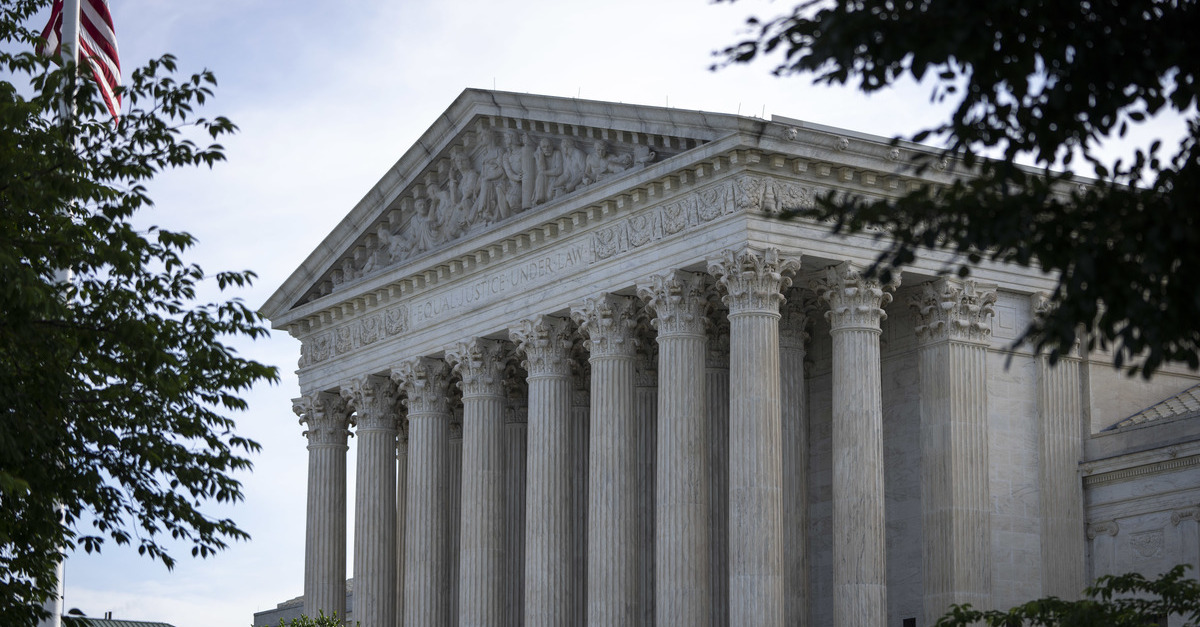
The Supreme Court of the United States unanimously decided Sanchez v. Mayorkas on Monday, ruling that a married couple who fled earthquakes in El Salvador cannot receive green cards even though they have been lawfully in the U.S. for 20 years and received “Temporary Protected Status” (TPS).
The ruling, which has potential to affect hundreds of thousands of immigrants with TPS, was not unexpected, but is being hailed as evidence of the urgency to create a “pathway to citizenship” for TPS holders and other immigrants.
This disappointing SCOTUS ruling underscores the importance of Congress acting swiftly to create a pathway to citizenship for TPS holders and Dreamers. Our immigrant communities deserve stability and certainty. https://t.co/gFMiMKN0BX
— Maura Healey (@MassAGO) June 7, 2021
Jose Santos Sanchez and Sonia Gonzalez left their home country of El Salvador and entered the U.S. unlawfully in 1997. In 2001, Sanchez and Gonzalez applied for and were granted TPS due to ongoing earthquakes in El Salvador. They’ve held that status, which entitles them to stay and work in the United States, ever since.
Now, the couple and thousands of others like them wish to obtain lawful permanent resident status (colloquially referred to as “getting green cards”). The government refused, finding the couple ineligible on the basis that their initial entry into the U.S. had been illegal. Sanchez and Gonzalez appealed to SCOTUS, which ruled against them on the basis that 8 U.S.C. §1255 requires that to become lawful permanent residents, immigrants must have been “inspected and admitted,” upon entry. Unfortunately for Sanchez and Gonzalez, the Court ruled that “nothing in the conferral of TPS changes [§1255’s requirement].”
Writing for the full Court, Justice Elena Kagan reasoned that §1255’s requirements are clear: an immigrant is only entitled to lawful permanent resident status if that person entered the country “pursuant to a lawful admission.” The justice went on to point out that Congress did legislate to distinguish among categories of immigrants. For example, there is a statutory difference between a foreign national who is lawful in status (like Sanchez and Gonzalez) because of having been granted asylum, and one who is unlawful in status (such as a person who legally entered on a student visa and then stayed after completing school). Given that Congress differentiated in those cases but did not change the lawful entry requirement for TPS holders, the Court would be unjustified in reading such a function into the statute.
“[A] grant of TPS does not come with a ticket of admission,” wrote Kagan, because it “does not eliminate the disqualifying effect of an unlawful entry.”
In a terse ruling just over eight pages, the Court appears to have anticipated criticism for a ruling that will create harsh consequences for many individuals; SCOTUS unequivocally laid responsibility for its decision at the feet of Congress. §1255, as drafted, clearly requires lawful admission as a prerequisite to obtaining a green card. Congress did create categories of non-immigrants who have not been admitted to the U.S., such as foreign nationals who serve on board a vessel or aircraft, or those who are cooperating with criminal investigations in the U.S.
“There could scarcely be a plainer statement of the daylight between nonimmigrant status and admission” than the distinctions that exist in the statute, remarked Kagan.
To underscore the point that Congress holds the power to remedy any unfairness resulting from the Court’s interpretation of the statute, Kagan wrote:
Congress, of course, could have gone further, by deeming TPS recipients to have not only nonimmigrant status but also a lawful admission. Legislation pending in Congress would do just that. See American Dream and Promise Act of 2021.
The legislation to which the Court refers was introduced in the House by Rep. Lucille Roybal-Allard (D-Cal.) and passed in March 2021. It creates a path to permanent resident status for several categories of immigrants, along with other immigration reforms.
Justice Kagan specifically explained that proposed legislation would amend §1254 a(f)(4) to formally consider a TPS recipient to have been “inspected and admitted into the United States” — a change that would make all the difference for Sanchez, Gonzalez, and the thousands like them.
“But even without that amendment,” Kagan concluded, driving home the limited role of the judiciary, “the statute does something—and this Court does not get to say that the something it does is not enough.”
[Photo by Drew Angerer/Getty Images]
Have a tip we should know? [email protected]